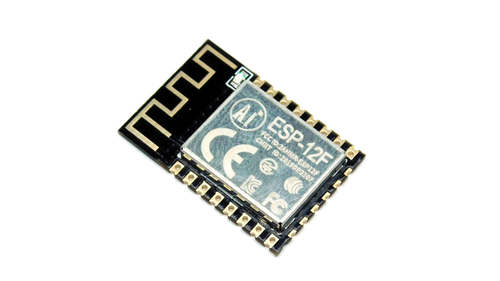Recently added
More...Categories
Suppliers
Newsletter
Once, twice in month we will send You info about new products, products on sale and news from Arduino and DIY world.
ESP-8266-12 WiFi module with 9 GPIO

ESP-12F is a small module with WiFi on board lets You connect Arduino to Internet. But theres a lot more! This tinny board can work as standalone microcontroller with WiFi connectivity and 11 GPIO!
On stock:
 249
249

| How many | Discount |
Price per piece
with VAT, in PLN |
|---|---|---|
| 1 | 15,99 | |
| 5+ | 10,00 % | 14,39 |
| 10+ | 15,00 % | 13,59 |
| 25+ | 20,00 % | 12,79 |
| 100+ | 30,00 % | 11,19 |
| Quantity discounts does not sum with other discounts | ||
ESP8266 - interesting platform for WiFi enabled projects
This small board can act as WiFi module for Arduino (or other µc - Teensy, Netduino, etc) or as standalone microcontroller. With RISC processor running at 80 MHz and with 4MB Flash You can do lot interesting projects. It has 9 GPIO pins to interact with other modules (OneWire, I2C, SPI).
ESP8266-12 technical details
- 9 GPIO ports, each PWM capable
- RISC processor 80MHz
- power supply 3.3V (3.6V max)
- logic levels 3.3V
- PCB antenna
- 4 MB of flasg
To program ESP You will need FTDI friend or USB/Serial converter. FTDI cable 3 V will work only if You provide other power source, FTDI cable, even 3V version has 5V at it’s power line.
W also carry adapter, which has all ESP GPIO in 2.54 raster - You can plug this adapter directly into breadboard or connect standard F-M cables.
Power supply During start and in some working modes ESP takes up to 220 mA of current. Not all USB/Serial converters will provide such current. In that case You will need some separate 3.3V source to power module. More on ESP8266 current consumption topic. TL;DR: module takes from 220 mA in 802.11b mode, through 130mA - 150 mA in n or g modes to single mA in power save modes.
What can I do with ESP8266-12?
This module works as WiFi gateway for other µcs, or as standalone node. Check this example (in polish) how we did connect DS18B20 temperature sensor to ESP8266-01, and it’s sending data to ThingSpeak: Nettigo::Blog
To program this module You can use LUA language, just upload nodeMCU firmware and You are ready to go :)
Useful links
- nodeMCU fw on github
- AT commands nurdspace.nl
- ESP8266 Wiki
- Tool for firmware uploading: ESPLORER
- Open project SUPLA - home automation with ESP8266 and other modules
Module is great tool for application prototyping. ESP8266 chip has FCC certification, however not as this module (with PCB).
ESP8266 / ESP32 modules








Dev boards ESP8266 / ESP32









Akcesoria i rozszerzenia:













Module datasheet
ESP-12F FCC
ESP-12F CE
Recently added
More...Categories
Suppliers
Newsletter
Once, twice in month we will send You info about new products, products on sale and news from Arduino and DIY world.
















